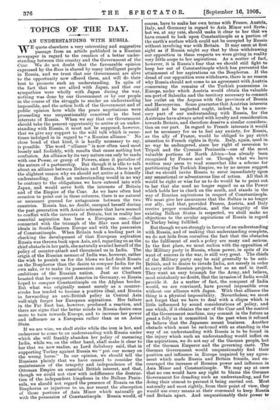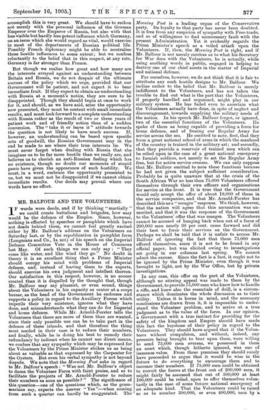TOPICS OF THE DAY.
WE quote elsewhere a very interesting and suggestive passage from an article published in a Russian newspaper in regard to the creation of a better under- standing between this country and the Government of the Czar. We do not doubt that the favourable opinion expressed by the Russ is shared by many intelligent people in Russia, and we trust that our Government are alive to the opportunity now offered them, and will do their best to promote such an understanding. In spite of the fact that we are allied with Japan, and that our sympathies were wholly with Japan during the war, nothing was done by our Government or by our people in the course of the struggle to render an understanding impossible, and the action both of the Government and of public opinion here while the peace negotiations were proceeding was unquestionably conceived in the best interests- of Russia. When we say that our Government should take the present opportunity to arrive at an under- standing with Russia, it must not be supposed, however, that we give any support to the wild talk which is some- times indulged in in regard to " a Russian alliance." No close bond of that kind, it is hardly necessary to say, is possible. The word " alliance " is now often used most loosely and foolishly, with results that cause nothing but confusion. An alliance by its very nature can only be made with one Power, or group of Powers, since it partakes of the nature of a partnership. But though it is idle to talk about an alliance between Britain and Russia, there is not the slightest reason why we should not arrive at a friendly understanding. Such an understanding would in no way be contrary to the obligations we have entered into with Japan, and would serve both the interests of Britain and of the Empire of the Czar. As we have often had occasion to point out in these columns, there is no natural or necessary ground for antagonism between the two countries. Russia has, no doubt, occupied herself during the past generation with Asiatic schemes that have seemed to conflict with the interests of Britain, but in reality her essential aspiration has been a European one,—that connected with the triumph of the Slav race and Slav ideals in South-Eastern Europe and with the possession of Constantinople. When Britain took a leading part in checking the development of that European aspiration Russia was thrown back upon Asia, and, regarding us as the chief obstacle in her path, she naturally availed herself of the policy of counter-attack and threatened us in India. The origin of the Russian menace of India was, however, rather the wish to punish us for the blows we had dealt Russia on the Bosphorus than the desire to conquer India for its own sake, or to make its possession one of the aims and ambitions of the Russian nation. Just as Chatham boasted that he conquered America in Germany, so Russia hoped to conquer Constantinople on the Afghan border. But what was originally meant merely as a counter- stroke has tended to become a positive ideal, and Russia in forwarding an anti-British policy in Central Asia well-nigh forgot her European aspirations. Her failure in the Far East has, however, produced a reaction, and there are signs that the better minds in Russia desire once more to turn towards Europe, and to increase her power and influence as a European rather than as an Asian State.
If we are wise, we shall strike while the iron is hot, and endeavour to come to an understanding with Russia under which she will frankly abandon her policy of menacing India, while we, on the other hand, shall make it clear to her that we now realise, as Lord Salisbury said, that in supporting Turkey against Russia we " put our money on the wrong horse." In our opinion, we should tell the Russians plainly that we have ceased to consider the maintenance of the integrity and independence of the Ottoman Empire an essential British interest, and that, though we could not view with indifference the destruc- tion of the independent kingdoms in the Balkan Penin- sula, we should not regard the presence of Russia on the Bosphorus as injurious to us, nor resent the absorption of those portions of Asia Minor which naturally go with the possession of Constantinople. Russia would, of course, have to make her own terms with France, Austria, Italy, and Germany in regard to Asia Minor and 'Syria; but we, at any rate, should make it clear to her that we have ceased to look upon Constantinople as a portion of the earth's surface which could not be occupied by Russia- without involving war with Britain. It may seem' at first sight as if Russia, might say that by thus withdrawing our opposition in these respects we were giving in reality very little scope to her aspirations. As a matter of fact,. however, it is Russia's fear that we should still fight to keep her out of Constantinople which has prevented the attainment of her aspirations ou the Bosphorus.. If the dread of our opposition were withdrawn, there is no reason why Russia should not come to an agreement with Austria concerning the remains of the Turkish possessions in Europe, under which Austria would obtain the valuable sea-port of Salonika and the territory necessary to connect her outlet on the Aegean with the provinces of Bosnia, and Herzegovina. Some guarantee that Austrian interests should not be neglected ought, indeed, to be a neces- sary part of our understanding with Russia, for the Austrians have always acted with loyalty and consideration towards Britain, and therefore deserve a similar considera tion on our part. In regard to French interests it would not be necessary for us to feel any anxiety, for Russia, as the ally of France, would be obliged to pay strict attention to French rights in Syria. Italy, again, need in. no way be endangered, since her right of reversion to Tripoli and the Cyrenaic Peninsula—one of the most valuable portions of North Africa—has already been, recognised by France and us. Though what we . have written may seem to read somewhat like a scheme for partitioning the Turkish Empire, we by no means suggest that we should invite Russia to enter immediately upon any sensational or adventurous line of action. All that it would be right or wise for us to do would be to point out to her that she need no longer regard us as the Power which holds her in check on the south, and stands in the way of Russian aspirations in respect of Constantinople.
We must give her assurances that the Sultan is no longer our ally, and that, provided France, Austria, and Italy receive proper consideration, and the integrity of the existing Balkan States is respected, we shall make no objections to the secular aspirations of Russia in regard to Turkey being fulfilled.
But though we are strongly in favour of an understanding with Russia, and of making that understanding complete, we do not hide from ourselves the fact that the obstacles to the fulfilment of such a policy are many and serious. In the first place, we must reckon with the opposition of the Military party in Russia, whose power, in spite of its want of success in the war, is still very great. The chiefs of the Military party may be said generally to be anti- British, and to desire to invade India, not merely in order to carry other Russian projects, but as an end in itself. They want an easy triumph for the Army, and believe, most mistakenly no doubt, that the invasion of India would provide it. As a matter of fact, the conquest of India would, we are convinced, have proved impossible even without our alliance with Japan. With that alliance the thing is a physical impossibility. Nevertheless,' we •must not forget that we have to deal with a clique which is little influenced by sound considerations of policy, and one which, if it obtains the ear of the Czar and the control of the Government machine, may commit in the future as great a folly as it committed in the past when it refused to believe that the Japanese meant business. Another obstacle which must be reckoned with as standing in the way of an understanding with Russia is to be found in the injury which such an understanding would inflict on the aspirations, we do not say of the German people, but of the German Emperor and the governing caste. The German Government would unquestionably find their position and influence in Europe impaired by any agree- ment which made Russia and Britain friends, and en- couraged the increase of Russian power and influence in Asia Minor and Constantinople. We may say at once that no one would have any right to blame the German Government for dreading such an understanding, and for doing their utmost to prevent it being carried out. "Most naturally and most rightly, from their point of view, they would use every means at their command to keep Russia and Britain apart. And unquestionably their power to accomplish this is very great. We should have to reckon not merely with the personal influence of the German Emperor over the Emperor of Russia, but also with that less visible but hardly less potent influence which Germany, on an issue which she would regard as vital, would exercise in most of the departments of Russian political life. Possibly French diplomacy might be able to neutralise these hostile influences to some .extent; but we confess reluctantly to the belief that in this respect, at any rate, Germany is far stronger than France.
But though we realise how great and how many are the interests arrayed against an understanding between Britain and Russia, we do not despair of the ultimate success of the policy which we urge, provided that our Government will be patient, and not expect it to bear immediate fruit If they expect to obtain an understanding with Russia at a moment's notice, they are sure to be disappointed. Though they should begin at once to work for it, and should, as we have said, seize the opportunity now presented, they must be content with small immediate results, and must look forward to a complete understanding with Russia rather as the result of 'two or three years of patient work and of friendly action than of a sudden conversion. The " take it or leave it " attitude towards the question is not likely to have much success. If, however, an understanding can be based upon specific acts of goodwill, the Russian Government may in the end be made to see where their true interests lie. We must never forget when dealing with Russia that she imagines us to be far more hostile than we really are, and believes us to cherish an anti-Russian feeling which has no existence, though no doubt our moments of stupid panic have given the appearance of such hostility. We must, in a word, embrace the opportunity presented to us, but we must not be disappointed if we cannot obtain immediate results. Our deeds may prevail where our words have no effect.











































 Previous page
Previous page